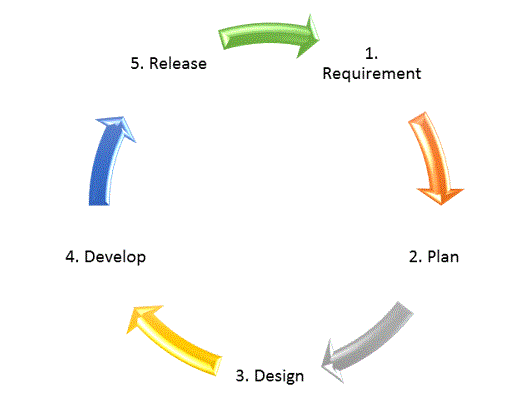What is Agile?
The Agile framework applies iterative and incremental methods throughout the project management lifecycle to be more responsive to change and to create outcomes which are more aligned with customer requirements. Teams are allowed to be more empowered and creative. The Agile framework can be diagrammatically represented as:

What are the benefits of taking the course?
The benefits are:
- Gain a high level of knowledge in handling projects using Agile methods
- Delegates can prepare for both courses from a single source
- Learn about business agility by which you can respond to the adapting environment
- The Agile methodology provides the skills for working in complex adaptive systems. The Agile methods separate the development of projects into sprints
- The Agile certification demonstrates an individual’s reliability
- Learning prioritisation helps you to understand the workings of a team
- Effectively plan, execute, and deliver the projects
Why choose Pentagon training?
Pentagon is the best training provider as we provide expertise and accomplishment in the domain of project management. We have experienced and certified instructors who provide the best support. The candidates will acquire hands-on experience of Agile methodologies.
Pentagon Training’s portal provides support and will be able to provide assistance 24*7. We are available to answer any queries and doubts before, during, and after the completion of the course
Which Agile methodology is best used in the industry?
Agile is executed in work environments using various methods. DSDM is one of the best approaches. DSDM stands for Dynamic Systems Development Method. DSDM was introduced in 1994 to deliver the industry standard project delivery structure. The main objective of DSDM is fast project execution. DSDM delivers the base to plan, manage, execute, and scale Agile processes.
The DSDM is based on nine principles that rotate around business values, rapid delivery, combined testing, and stakeholder collaboration. DSDM is considered suitable for business purpose, because 80% of systems can be organised in 20% of the time.
The requirement analysis is done at an earlier stage in the project. The development processes are made rescindable. The requirements are planned based on MoSCoW methods, which are:
- M: must have requests
- S: should have if all are possible
- C: could have but not the critical ones
- W: will not have now but may arise later
The critical work is made complete first. The lowest priority supplies are made out of implementation processes so the high priority requirements can be finished.
Business Agility:
Businesses need to rapidly respond to changes by familiarising the initial stable configuration. The business agility can be conserved by supporting and refining services and goods to accomplish customer demands. Agility is the capability to adjust to market and environments in an organisation, as agile provides complex adaptive systems and complexity science.
The difference between the Agile and Waterfall model:
- In the waterfall model, the software process is divided into phases whereas the Agile methods divide the development of projects into sprints.
- The waterfall model is fairly rigid whereas the Agile methodology is known for it's flexibility.

 ENQUIRE
ENQUIRE
 REQUEST CALLBACK
REQUEST CALLBACK
 GET A FREE QUOTE
GET A FREE QUOTE


 Introduction
Introduction Course Details
Course Details Course Content
Course Content



 London
London